Southern Guild presents Faces and Phases 19 by Zanele Muholi as well as In Us is Heaven, a group exhibition by African and North American artists, both at the gallery’s Los Angeles space.
Faces and Phases 19 celebrates 19 years of Zanele Muholi’s seminal photographic project documenting the lives of Black people. Initially focused on South Africa, the new series of portraits expands the project’s geography into the US, UK, Brazil and Portugal. This body of work comprises a collection of close to 1,000 photographs moved into action by both love and loss, all of which began in 2006.
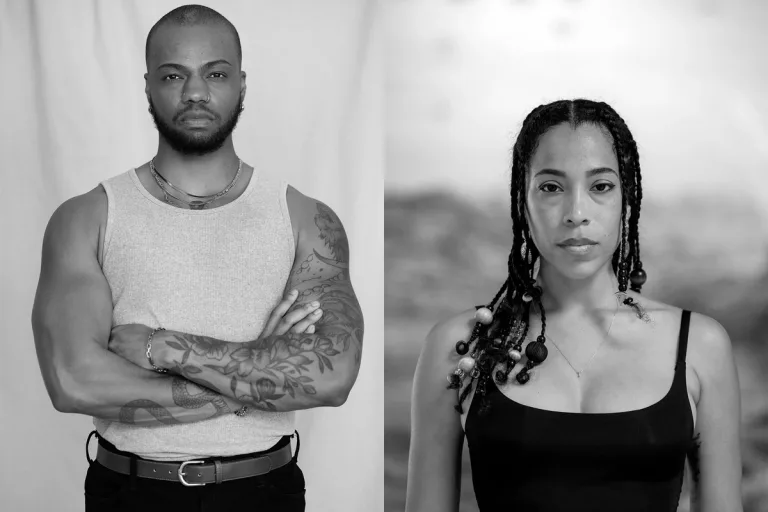
Further, Faces and Phases documents the LGBTQIA+ community’s experiences of grief, often aggravated in the media by traumatising imagery or faceless statistics, with this exhibition Muholi assert a counternarrative. In the collection of minimally staged, non-glamorised black-and-white portraits, stories of black lives are presented as beautiful, defiant and normal.
With this exhibition, Muholi stares directly at the colonial archive and at modern histories of patriarchy and violent attempts on Black lives. The artist stares down escalating global fascism, which chooses the trans body, the colonised body, the diasporic, immigrant, or otherwise ‘foreign’ body as the site upon which to wage war. As Muholi describes it, “it’s like everyone is looking at you no matter what direction you take”, ultimately landing these gazes on the body of the viewer, who is unable to escape either their scrutiny or their beauty.
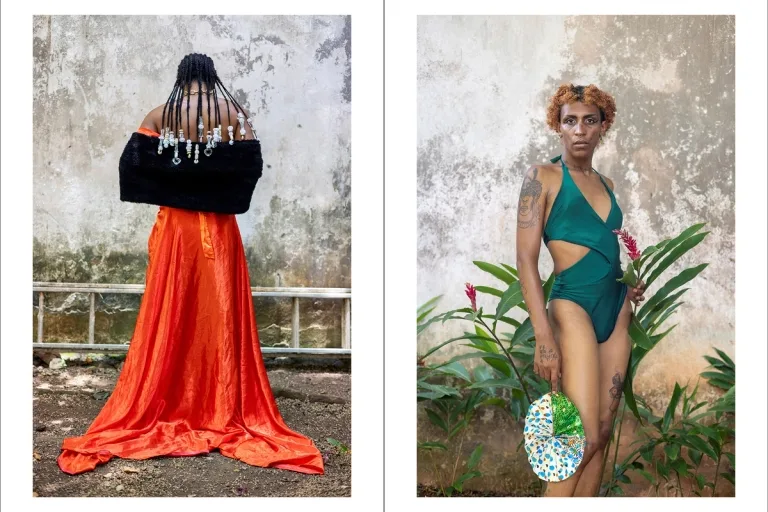
The act of return is absolutely central to this body of work, with Muholi often revisiting and rephotographing participants over the years, allowing time and the joyous instability of identity to do its work. Faces and Phases does not claim to ‘conclude’ the impossible, slippery task of representation, but through frequent return, commits to remaining alive with the concerns and tensions of the photographed participants, a term Muholi prefers to ‘subject.’ This body of work exhibits an intrinsic understanding of the participants’ wounds, whether inherited colonial histories, or personal experiences of oppression from their different backgrounds.
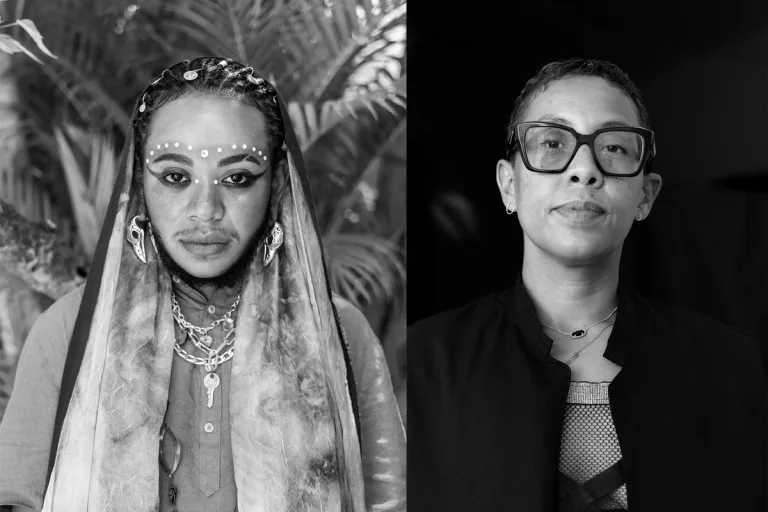
In its current iteration in Los Angeles, Faces and Phases presents a particular defiance of the current US administration, which makes one of its missions the targeting of Trans bodies. The nation’s dominance has global consequences, not least of which is in the withdrawal of funding from Global South initiatives that provide support and healthcare to Queer and Trans people, including in South Africa. These larger stories underlie the personal narratives of Muholi’s Faces and Phases portraits, which are both a demonstration of solidarity-across-borders and a refusal of the idea that ‘true’ knowledge is only produced by the West. This exhibition runs from the 16th of May and will run until the 6th of September 2025 at Southern Guild’s LA space.
Secondly, Southern Guild Los Angeles presents In Us is Heaven, a group exhibition featuring interdisciplinary artists from Africa and North America exploring experience and expression.
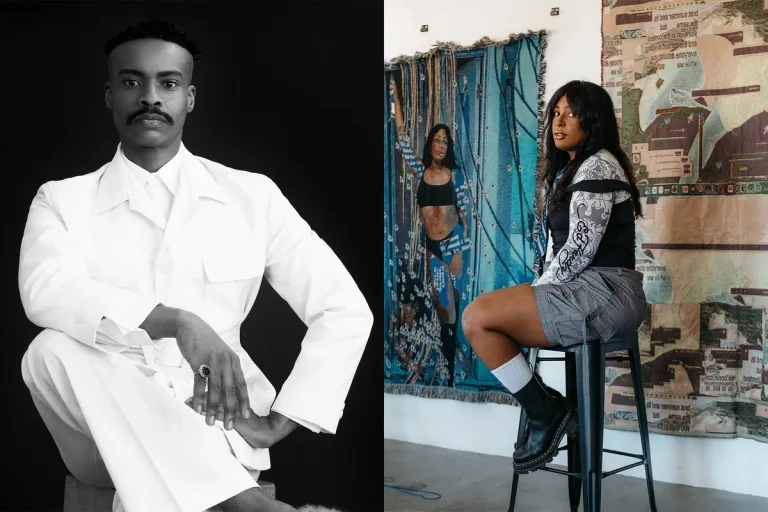
In Us is Heaven serves as both sanctuary and site of confrontation. Negotiating heterogenous experiences and aesthetics,
The exhibition’s works take on the idea that art produced by marginalised and historically disadvantaged groups such as black, African, and queer people is not marginal or other – it is everywhere, existing and persisting in the intersections of our cultural, political, spiritual and emotional landscapes. In Us is Heaven questions systems of regulation that enforce difference, shame and social failure, advocating for healing through the infinite resource of unbounded love.
Featured artists include Queezy Babaz, Lea Colombo, Rich Mnisi, Zanele Muholi, Oluseye, Catherine Opie, Araba Opoku, Jody Paulsen, Athi-Patra Ruga, Brett Charles Seiler, Chiffon Thomas and Qualeasha Wood, among others. The exhibition embraces Cuban-American scholar José Esteban Muñoz’s proposition that “Queer utopia” exists in the now as a possible but not-yet-reached horizon. In Us is Heaven explores the fluid contours of Queer being not only as lived experience but as a visionary realm where personhood and autonomy are reimagined beyond the binary confines of heteropatriarchy, normative function, nationalism and coloniality.
The predominant presence of photography, as both documentary and speculative form, serves here as a mode of reclamation. The early 20th century saw the medium weaponised against the Queer community through surveillance, police records and psychiatric documentation. In response, artists and activists sought to image themselves in love, protest, joy and camaraderie, offering personal counter-narratives to mainstream erasure and the proliferation of reductive images of Queer life.
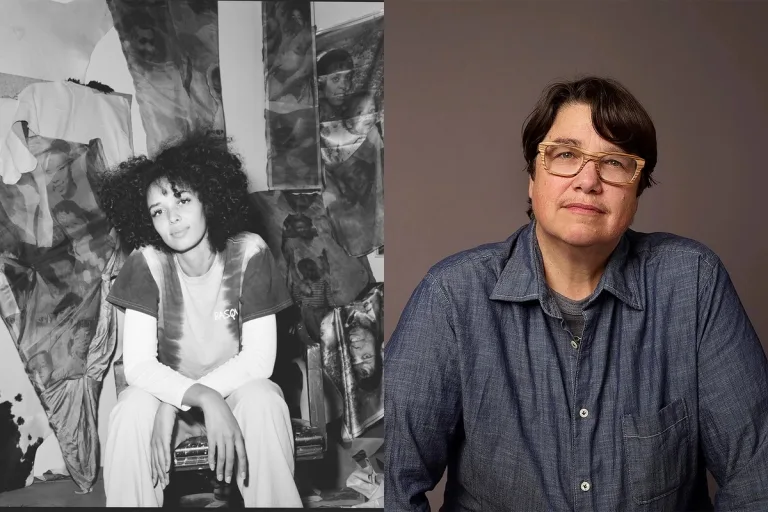
Athi-Patra Ruga’s hallucinatory tapestry, ‘Jacob About to Wrestle an Angel’, sees the artist render himself in the image of Senegalese Cabaret dancer Féral Benga. Striking a pose of come-hither provocation, Ruga’s figure is without male or female genitalia. This withholding interrogates the racialised and gendered economies of desire, calling keen attention to the phallus as a site of both fixation and critique. Drawing on African traditions, camp aesthetics and the expansive history of fetish culture.
Gender as performance requires the symbiotic gaze of another, made real through the awareness of being perceived. The exaltation of the human form is explored in the work of Rich Mnisi. The hyper-masculine bodybuilder in Mnisi’s ‘Matimba (Strength)’, speaks to cultures of body conditioning within gay communities, where the body becomes either a signifying trophy or a territory for scrutiny. Beyond this internalised consciousness of being seen, Mnisi conjures the vulnerability and plurality of all masculinities, gestured in the closed eyes of his otherwise hardened subject.
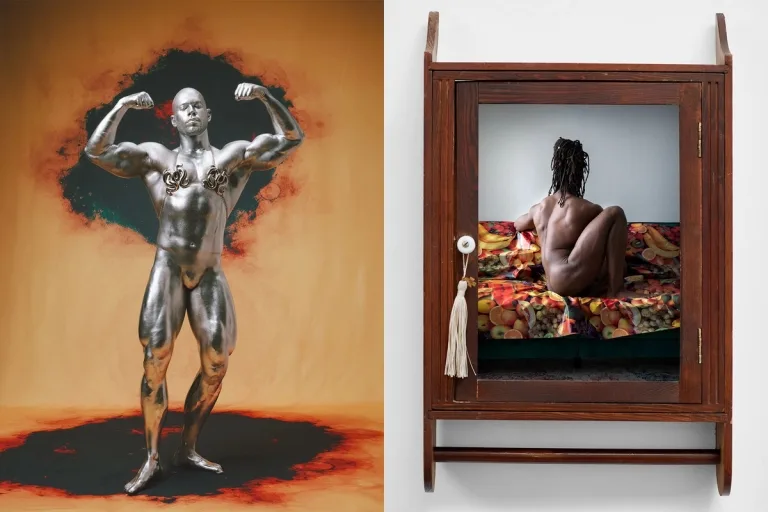
Jody Brand through her photography envisions the multiverse of experiences and complex personhood of her collaborators, this way she disrupts homogenous tropes of victimhood and trauma around the lives of femme individuals who exist outside of the centres of power. This is seen in her series with which she pays tribute to Nokuphila Khumalo, a 23-year-old South-African sex worker, murdered in 2013 by a well-known South African artist-photographer.
As public spaces regress into systematically policed spheres for gender non-conforming persons, Qualeasha Wood and Araba Opoku nurture speculative, abstract realms for creation and identity formation. Opoku’s meditative dreamscape, realised through fluid and repetitive mark-making, considers the psyche a portal where healing, failure and transformation coexist. Opoku finds spiritual architecture in intuitive form and pattern, building layered worlds that resist linear temporalities and fixed identity. In Us is Heaven opened on the 16th of May and will run until the 6th of September 2025 at Southern Guild’s Los Angeles space.


